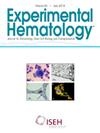BAF染色质重塑复合物的Bcl7b和Bcl7c亚基在造血中是必不可少的。
IF 2.1
4区 医学
Q2 HEMATOLOGY
引用次数: 0
摘要
染色质重塑已成为造血细胞发育的重要调节因子和各种人类血液系统恶性肿瘤的潜在驱动因素。atp依赖性BAF染色质重塑复合物,与酵母SWI/SNF相关,决定基因表达程序,从而促进造血干细胞和祖细胞的自我更新、承诺和谱系特异性分化。在这里,我们研究了造血组织中BAF复合物核心Bcl7b和Bcl7c亚基难以捉摸的生物学功能。我们对小鼠组成型敲除等位基因的分析表明,Bcl7b和Bcl7c对于动物存活和成人稳态造血都是必不可少的。Bcl7b和Bcl7c双敲除(dKO)小鼠可维持长期造血功能,对造血干细胞(HSC)室无明显影响。此外,我们发现Bcl7b/Bcl7c dKO造血干细胞在竞争性序列移植后能够正常的多系造血重建。总的来说,这些研究表明BAF复合物的Bcl7b和Bcl7c亚基对于正常造血是必不可少的。本文章由计算机程序翻译,如有差异,请以英文原文为准。
Bcl7b and Bcl7c subunits of BAF chromatin remodeling complexes are largely dispensable for hematopoiesis
Chromatin remodelers have emerged as prominent regulators of hematopoietic cell development and potential drivers of various human hematological malignancies. ATP-dependent BAF chromatin remodeling complexes, related to yeast SWI/SNF, determine gene expression programs and consequently contribute to the self-renewal, commitment, and lineage-specific differentiation of hematopoietic stem cells (HSCs) and progenitors. Here, we investigated the elusive biological function of the core Bcl7b and Bcl7c subunits of BAF complexes in hematopoietic tissue. Our analysis of mouse constitutive knockout alleles revealed that both Bcl7b and Bcl7c are dispensable for animal survival and steady-state adult hematopoiesis. Bcl7b and Bcl7c double knockout (dKO) mice can maintain long-term hematopoiesis with no observable effect on the HSC compartment. Moreover, we show that Bcl7b/Bcl7c dKO HSCs are capable of normal multilineage hematopoietic reconstitution after competitive serial transplantation. Collectively, these studies suggest that the Bcl7b and Bcl7c subunits of BAF complexes are dispensable for normal hematopoiesis.
求助全文
通过发布文献求助,成功后即可免费获取论文全文。
去求助
来源期刊

Experimental hematology
医学-血液学
CiteScore
5.30
自引率
0.00%
发文量
84
审稿时长
58 days
期刊介绍:
Experimental Hematology publishes new findings, methodologies, reviews and perspectives in all areas of hematology and immune cell formation on a monthly basis that may include Special Issues on particular topics of current interest. The overall goal is to report new insights into how normal blood cells are produced, how their production is normally regulated, mechanisms that contribute to hematological diseases and new approaches to their treatment. Specific topics may include relevant developmental and aging processes, stem cell biology, analyses of intrinsic and extrinsic regulatory mechanisms, in vitro behavior of primary cells, clonal tracking, molecular and omics analyses, metabolism, epigenetics, bioengineering approaches, studies in model organisms, novel clinical observations, transplantation biology and new therapeutic avenues.
 求助内容:
求助内容: 应助结果提醒方式:
应助结果提醒方式:


